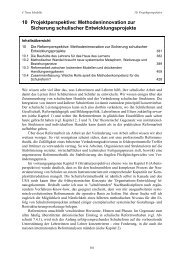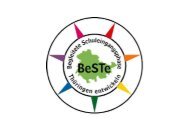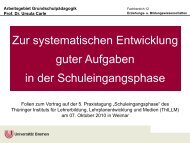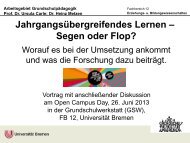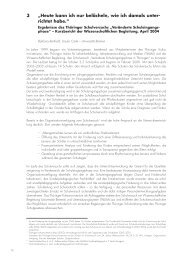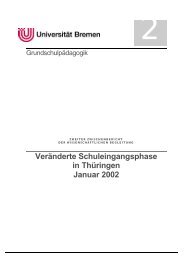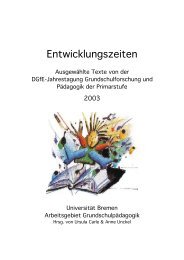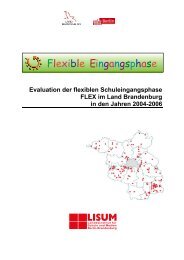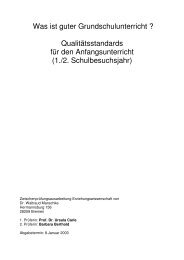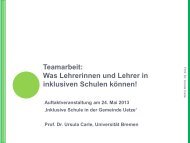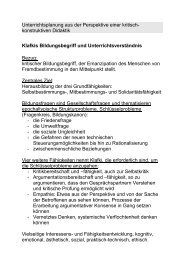Bianca Roters
Bianca Roters
Bianca Roters
Sie wollen auch ein ePaper? Erhöhen Sie die Reichweite Ihrer Titel.
YUMPU macht aus Druck-PDFs automatisch weboptimierte ePaper, die Google liebt.
<strong>Bianca</strong> <strong>Roters</strong><br />
„Empirische Forschung tut not.<br />
Ohne Forschung bleibt die Praxis blind.“<br />
(Henrici)<br />
Reflection as Social Practice –<br />
Forschendes Lernen und<br />
Demokratisierung von Schule als<br />
Aufgabe und Zielsetzung der<br />
LehrInnenbildung in den USA<br />
Forschungsforum DGfE, Mainz<br />
17.03.2010<br />
1<br />
www.bianca-roters.de
<strong>Bianca</strong> <strong>Roters</strong><br />
Überblick Vortrag<br />
• USA: Ursprungsgedanke der Demokratisierung<br />
• Lehrerforschung I: Konzept Reflective Practice<br />
• Lehrerforschung II: Aktionsforschung<br />
• Begründung für forschende Haltung und<br />
theoretische Bezüge<br />
• Kritik an Reflective Practice<br />
2
<strong>Bianca</strong> <strong>Roters</strong><br />
USA: Ursprungsgedanke der Demokratisierung<br />
Unabhängigkeitserklärung USA:<br />
“We hold these truths to be self-evident, that all men are<br />
created equal, that they are endowed by their Creator with<br />
certain unalienable Rights, that among these are Life, Liberty and<br />
the pursuit of Happiness. That to secure these rights,<br />
Governments are instituted among Men, deriving their just<br />
powers from the consent of the governed”<br />
→ dieser Anspruch kann nur durch Wahrnehmung der<br />
demokratischen Rechte erfüllt werden:<br />
Demokratisierung durch öffentliche Schulen und<br />
Bildung für alle (Oelkers 2009: 35)<br />
Hauptakteure: Thomas Jefferson, Horace Mann, und John Dewey<br />
17.03.2010<br />
3
<strong>Bianca</strong> <strong>Roters</strong><br />
Lehrerforschung I: Reflective Practice<br />
• Reflective Practice vor allem unter Bezugnahme auf<br />
den Pragmatismus (John Dewey, Georg Herbert Mead)<br />
• Betrachtung von eigenen (Vor-)Annahmen und Wissen<br />
„in the light of the grounds that support it and the<br />
further conclusion to which it tends“(Dewey 1933)<br />
3 Faktoren von Deweys Gesellschaftsanalyse:<br />
• Zunahme wissenschaftlicher Denkmethoden<br />
• zunehmende Industrialisierung<br />
• zunehmende Demokratisierung von Lebensprozessen<br />
17.03.2010<br />
4
<strong>Bianca</strong> <strong>Roters</strong><br />
Reflexionszyklus (vgl. Dewey 2002)<br />
Reflexion der Praxis<br />
Veränderung<br />
der Praxis vor<br />
dem<br />
Hintergrund<br />
theoretischempirischer<br />
Ergebnisse<br />
Dateninterpretation<br />
Forschungsfeld<br />
Formulierung einer<br />
Forschungsfrage<br />
Literaturrecherche +<br />
Datenerhebung<br />
Externe, biografische<br />
Einflüsse<br />
Datenanalyse<br />
17.03.2010<br />
5
<strong>Bianca</strong> <strong>Roters</strong><br />
Reflective Practice und<br />
soziale Gerechtigkeit<br />
Zeichner (1996) unterscheidet in der social<br />
reconstructionist-Perspektive drei Elemente von<br />
reflexiver Praxis, die soziale Gerechtigkeit und<br />
Gleichheit fördern sollen:<br />
• Reflexion über soziale und politische Dimensionen von<br />
Schule<br />
• Reflexion als soziale Praxis/reflection as social practice:<br />
Reflexion als politischer Akt (Bsp: Civil Rights<br />
Movement)<br />
• Reflexion über eigene Praxis und den sozialen,<br />
kulturellen und institutionellen Kontext<br />
(→ Lehrerforschung II: Aktionsforschung)<br />
17.03.2010<br />
6
<strong>Bianca</strong> <strong>Roters</strong><br />
Definition Aktionsforschung<br />
“Action Research is a form of self-reflective inquiry<br />
undertaken by participants in social (including<br />
educational) situations in order to improve the<br />
rationality and justice of (a) their own social or educational<br />
practices, (b) their understanding of these practices, and (c)<br />
the situations in which the practices are carried out. It is<br />
most rationally empowering when undertaken by<br />
participants collaboratively...sometimes in cooperation<br />
with outsiders.“ (Kemmis zitiert in Hopkins, 1985)<br />
→ Aktionsforschung als eine Variante der<br />
Lehrerforschung<br />
17.03.2010<br />
7
<strong>Bianca</strong> <strong>Roters</strong><br />
Beitrag<br />
zur Professionalisierung<br />
angehender LehrerInnen<br />
17.03.2010<br />
8
<strong>Bianca</strong> <strong>Roters</strong><br />
Aktionsforschung in die Lehrerbildung –<br />
Versuch einer Einordnung<br />
Wissenschaft<br />
theoretische und<br />
empirische Befunde<br />
Partizipatorische<br />
Aktionsforschung<br />
im Team<br />
Praxis<br />
Handlungsfeld<br />
Praxis (Schule)<br />
Person<br />
17.03.2010<br />
Auf dem Weg zum<br />
reflektierender Praktiker<br />
9
<strong>Bianca</strong> <strong>Roters</strong><br />
Forschende Haltung von Experten<br />
• Novizen-Expertenforschung (Leinhardt & Greeno 1986,<br />
Bromme 1992): kategoriale Wahrnehmung der<br />
Experten und Problemlöseverhalten abseits von<br />
Routinen (problem framing, Schön 1983, gegen<br />
technical rationality)<br />
• Möglichkeit, Routinen in der Praxis reflektiert zu<br />
begegnen: Entwicklung einer forschenden Haltung<br />
(vgl. für forschendes Lernen in schulpraktischen<br />
Studien; Schneider/Wildt 2004, Übersicht über Ansätze<br />
im deutschsprachigen Raum Koch-Priewe/Thiele 2009)<br />
17.03.2010<br />
10
<strong>Bianca</strong> <strong>Roters</strong><br />
Kritik an Reflective Practice<br />
• Popularität von Reflective Practice: nicht ausschließlich<br />
Wertschätzung des Praktikerwissens, sondern Teil der<br />
Zentralisierungsbestrebungen der Lehrerbildung<br />
(Smyth 1995)<br />
• Grundsätzliche Frage: Muss jeder angehender<br />
Lehrer ein reflektierender Praktiker werden?<br />
→ Hatton/Smith 1995; Schön 1983/1987:<br />
Reflexion als professionelle Disposition<br />
17.03.2010<br />
11
<strong>Bianca</strong> <strong>Roters</strong><br />
Vielen Dank<br />
für Ihre Aufmerksamkeit!<br />
17.03.2010 12<br />
www.bianca-roters.de
<strong>Bianca</strong> <strong>Roters</strong><br />
Literatur<br />
Dewey, J. & R. : Horlacher 2002. Wie wir denken. Zürich: Verl. Pestalozzianum.<br />
Hatton, N. & D. Smith 1995. "Reflection in teacher education: Towards definition<br />
and implementation". In: Teaching and Teacher Education, Jg. 11, H. 1, 33–49.<br />
Hatton, N. & D. Smith 1995. "Reflection in teacher education: Towards definition<br />
and implementation". In: Teaching and Teacher Education, Jg. 11, H. 1, 33–49.<br />
Kemmis, S., and McTaggert, R. 1990. The Action Research Planner. Geelong:<br />
Deakin University Press .<br />
Koch-Priewe, B. & J. Thiele 2009. "Versuch einer Systematisierung der<br />
hochschuldidaktischen Konzepte zum Forschenden Lernen". In: B. <strong>Roters</strong>,R.<br />
Schneider,B. Koch-Priewe, J. Thiele, J. Wildt, Hrsg.: Forschendes Lernen in<br />
Praxisstudien – Hochschuldidaktik. Professionalisierung. Kompetenzentwicklung.<br />
Bad Heilbrunn: Klinkhardt.<br />
Leinhardt, G. & G. Greeno 1986. "The cognitive skill of teaching". In: Journal of<br />
Educational Psychology, Jg. 78, 75–95.<br />
Oelkers, J. 2009. John Dewey und die Pädagogik. 1. Aufl. Weinheim: Beltz.<br />
Schön, D. 1983. The reflective practitioner. How professionals think in action.<br />
New York: Basic Books.<br />
Liston, D. & K. M. Zeichner 1996. Culture and teaching. Mahwah, NJ: Erlbaum<br />
(Reflective teaching and the social conditions of schooling).<br />
13



